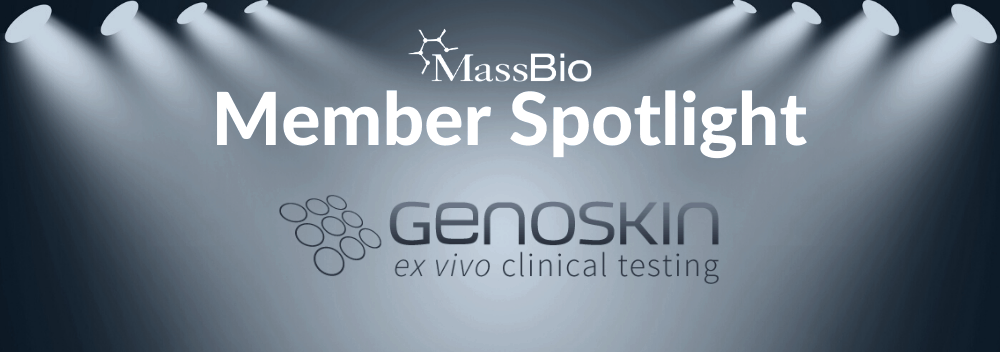
Every month, MassBio spotlights a member company and the great work they’re doing to advance the life sciences industry and support the patients we serve. In February, we spoke with Pascal Descargues, PhD, Founder & CEO, Genoskin. Pascal started working on his project to develop more adequate human skin models in 2009 with the French National Center for Research and the Paul Sabatier University, leading to the creation of Genoskin in 2011. By combining his constructive managerial skills with his sense for philanthropy, Pascal strives to turn Genoskin into the best toolbox for researchers who want to move forward using better and more ethical testing techniques.
Tell us about your organization, its mission, and current initiatives

Genoskin is a biotech company founded in 2011 in Toulouse, France, new labs and offices were established in the Boston area in 2017. We have developed a way to keep human tissues alive and functional for 7+ days. We provide ready-to-use, standardized, immunocompetent and injectable human skin assays. Our technology bridges the gap between in vitro testing and clinical testing, replacing the animal experimentation step.
Our mission is to provide earlier access to clinical human skin data. Genoskin empowers the biotech, pharmaceutical, medical device, and cosmetic industry to generate relevant human data.
NativeSkin®, maintains all the characteristics and functions of real live human skin while HypoSkin®, is the world’s first injectable ex vivo platform of human skin. Genoskin has also developed innovative psoriasis and wound-healing models.
How does your organization’s activities help patients now and into the future?
By enabling the earlier generation of actual human data, our assays are designed to facilitate research and accelerate drug development.
Genoskin’s assays support toxicity screening and efficacy testing of a large variety of drugs and medical devices. They represent a highly effective tool for preclinical studies, generating actual human data.
As most clinical trial failures are due to interspecies differences between the animal studies in the preclinical stage and humans, our assays can de-risk clinical testing by providing better and more reliable human data.
Replacing animal experiments on the skin with Genoskin assays helps pharmaceutical companies reduce preclinical studies costs, save time and launch clinical trials faster and with fewer risks of failures.
A successful clinical trial means the tested drug can be marketed earlier, and patients could benefit from it earlier too.
What do you see as the biggest challenge facing the life sciences industry today?
The life sciences industry faces various challenges. Today, we see growing concerns from patients towards animal testing as part of the drug development process. Life sciences companies need to reduce and replace these long and expensive processes with new biotechnologies that are cheaper, faster, more reliable and relevant.
The success of clinical trials is pivotal to the drug development process. As they are complicated and expensive, companies need positive results out of them. To achieve this goal, we need to reduce failure causes such as interspecies differences in preclinical studies.
Real human assays like HypoSkin® provide relevant, reliable and predictable data on toxicity and efficacy, de-risking clinical trials and accelerating the overall process of drug development.
What’s next for your organization / what are you focused on in the coming year?
Genoskin is a fast-growing startup. For the year to come, we plan on increasing our growth worldwide with a focus on the US and ASIA PAC markets. To do so, we plan on increasing our capacities with new equipment and new collaborators that will help us expand our production capacity and help our continuing research on skin models.
One of our goals is also to provide easier access to our most basic assays via an online purchasing platform.
We also believe in growing through partnerships and intend to further develop our relationships and establish new ones. We will continue to improve our models and publish validation data.
If you’re interested in being featured in MassBio’s Member Spotlight, please see guidelines here.